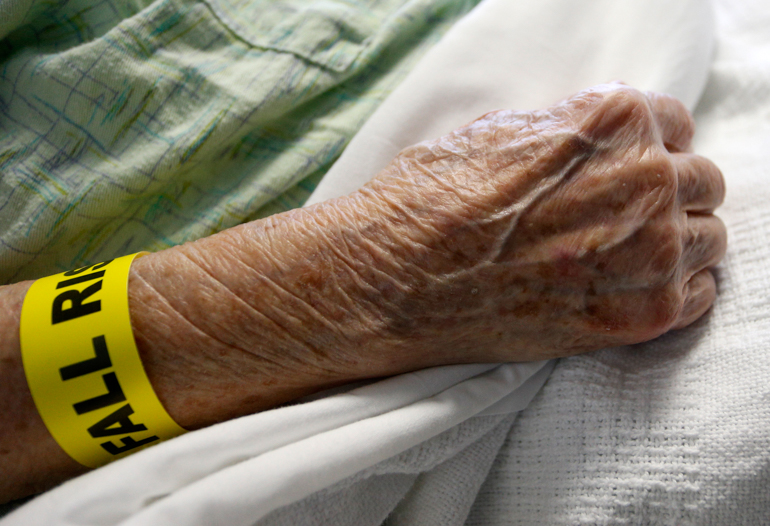The old man slept quietly as his daughter sat by his hospital bed. Suddenly, an aide walked in and announced that a move was imminent.
“Your time here is up,” Bonnie Miller Rubin remembers the aide explaining. “He’s going to a nursing home.”
It was 9 p.m., and Rubin’s 91-year-old father had been asleep for several hours. “I said, ‘Are you kidding me?’” Rubin recalled.
“I felt powerless,” she said, remembering her alarm on that cold night three years ago. “What rights did I have?”
In fact, Rubin could have filed a “fast appeal” of her father’s pending discharge with a Medicare Quality Improvement Organization. If she’d made a telephone call on the spot, her father would have stayed in the hospital until an independent physician reviewed his circumstances.
Every older adult admitted to a hospital as an inpatient has the right to challenge a discharge if he or she feels unprepared to leave. But few people understand the process that’s involved.
Frequently, seniors and their families are caught by surprise when a transfer from the hospital is at hand.
“People don’t understand how fast-tracked things get,” said Trish Colucci, a principle care manager with Peace Aging Care Experts in Flanders, N.J. “There’s enormous pressure on discharge teams to get patients out.”
 NAVIGATING AGING
NAVIGATING AGINGAfter a lawsuit charging that Medicare was not giving beneficiaries adequate notice of the right to appeal pending discharges, the government issued new regulations on the process a decade ago. Here’s how so-called “fast appeals” are supposed to work:
Know your rights. Every older adult admitted to the hospital should get a written notice of their rights — including the right to appeal planned discharges — within two days. If you remain in the hospital for at least five days, you should receive a second notice before being discharged.
This “Important Message from Medicare” will give you the name and a phone number for your Medicare Quality Improvement Organization (QIO) — an entity charged with handling fast appeals as well as other matters, such as complaints about the quality of care.
QIOs serve older adults on traditional Medicare as well as seniors with managed care-style Medicare Advantage plans. Livanta is the QIO for seniors with Medicare who live in the Northeast and the West Coast. KEPRO covers the rest of the country.
Rubin doesn’t remember receiving these notices from Evanston Hospital, just outside Chicago, where her father was being treated for respiratory distress. But Jim Anthony, a hospital spokesman, said the medical center always distributes them, as required.
The medical center began planning the older man’s transition to a nursing home on “the day of admission, with the family’s knowledge,” Anthony explained.
The bottom line: Read all the documents that you’re handed in the hospital. Don’t assume you can put off doing so until later.
Initiating an appeal. If you don’t feel ready to leave the hospital, call the QIO and explain that you’re filing a fast appeal of a pending discharge. You can call during the day or at night up until just before midnight on the day that the discharge was set to occur.
If someone’s not manning the phones — QIOs are open 9 a.m. to 5 p.m. during the work week and 11 a.m. to 3 p.m. on weekends and holidays — leave a message explaining your situation.
A family member or caregiver can initiate the process if a patient is unable to do so. But they may subsequently need to fill out a form clarifying that they can act as the patient’s representative.
In California, a new law that took effect in January requires hospitals to notify caregivers “as soon as possible” when patients are to be discharged. If the patient is to be sent home — as opposed to a nursing home — the caregiver must be instructed on the patient’s needs following hospitalization, including wound care, medication management and injections.
Under the law, hospitals are required to ask patients when they’re admitted if they’d like to designate a caregiver. That person can be anyone the patient chooses, not just a family member, said Nina Weiler-Harwell, an associate state director with AARP California.
AARP California is informing its members and partners of the new law, and printable wallet cards can be downloaded from AARP’s website.
Weiler-Harwell said more than 30 other states have adopted similar legislation.
Among Medicare patients, only those admitted to the hospital qualify for a fast appeal of a pending discharge through a QIO. Patients on “observation status” have a separate appeals process. So make sure you clarify your status often, since it might not be clear.
Hold tight. Once a fast appeal has been lodged, you can’t be transferred from the hospital until its resolution. Usually, that takes about two days.
Nor can you be charged for the extra time you spend in the hospital, though coinsurance payments and deductibles will still apply.
The hospital will send a copy of your records to the QIO, to be examined by an independent medical reviewer. You have a right to see these documents, if you so choose. The QIO will contact you and inquire about your discharge concerns.
If the QIO determines that a discharge is appropriate, you can stay in the hospital until noon the next day, at no extra charge. If the QIO overrules the hospital, you can stay until another discharge is proposed.
The standard? Medical care in the hospital must be deemed medically necessary by your physician.
If you’ve stabilized, without symptoms such as a fever, difficulty breathing, or a purulent wound, you’ll probably be considered ready for transfer, said Anne Sansevero, a registered nurse and aging life care specialist in New York City.
Stay informed. It’s a good idea to ask your doctor every day “Is there any update on how long I’m likely to be here?” so you don’t find yourself “in a last minute situation,” said Liz Barlowe, a care manager from Seminole, Fla.
If the hospital hasn’t adequately addressed your need for a “safe discharge,” you may have grounds to contest its decision.
Barlowe described a 78-year-old client who fell and broke her hip when visiting her son and daughter. Preparing for surgery, scans showed that the woman had masses in her uterus and pelvis — cancer.
After hip surgery, hospital staff said they couldn’t bring in a gynecologic oncologist to consult on the older woman’s case, and recommended that she be sent to a rehabilitation center.
Barlowe immediately contacted KEPRO, which overturned the hospital’s decision. Instead, the QIO’s medical reviewer directed that the patient stay there until a cancer specialist provided a consultation and helped to devise a plan of care.
The QIO’s intervention bought the family another 48 hours, during which time they were able to find a facility in Miami able to offer chemotherapy as well as rehabilitation for the woman’s hip. And the patient was able to rest and build up her strength.
Fast appeals similarly exist for hospice, home health, skilled nursing and rehabilitation services, but the rules and time frames involved differ slightly.
California Healthline Senior Correspondent Emily Bazar contributed to this column.
This story was produced by Kaiser Health News, an editorially independent program of the Kaiser Family Foundation.


